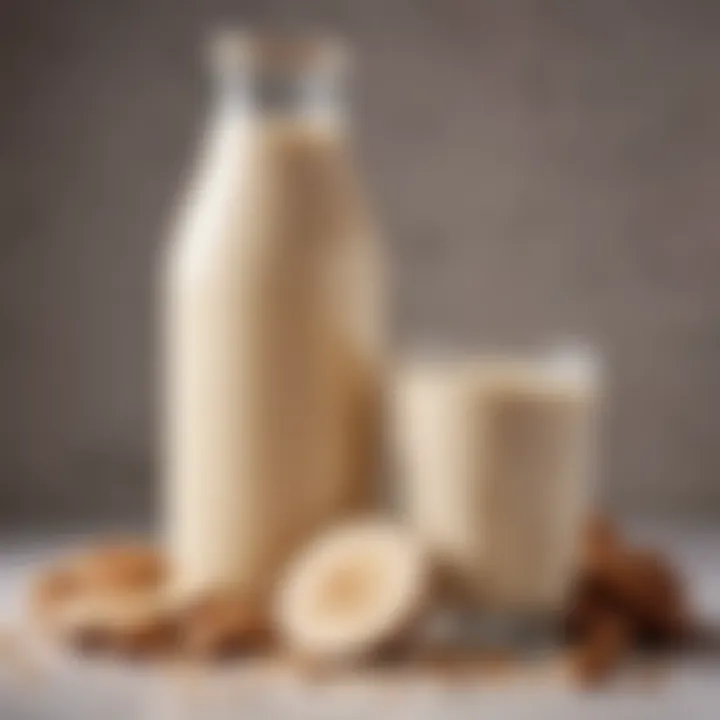Exploring Vegan Milk Drinks: Benefits and Recipes


Intro
The world of vegan milk drinks has flourished, and it's a real treat for anyone interested in food and health. As we dive into this guide, get ready to discover a plethora of options, from classic almond milk to the more unique oat or cashew milk. Many people are embracing these alternatives not just for their taste but for the various benefits they may provide.
With an ever-growing selection, knowing how to navigate this plant-based landscape is crucial. Whether you're interested in nutrition, sustainability, or simply trying to up your cooking game, this guide aims to be a valuable resource. So, put on your chef's hat, and let’s explore what vegan milk drinks can offer.
Ingredients Breakdown
Diving into the fundamentals, understanding the right ingredients is paramount in crafting your vegan milk drinks.
Primary Ingredients
To whip up a stellar vegan milk drink, consider starting with these common ingredients:
- Almonds: A popular choice, offering a nutty flavor.
- Coconut: Both coconut water and coconut meat can infuse a tropical vibe.
- Oats: Perfect for those who enjoy a creamy texture without nuts.
- Soybeans: Known for their high protein content and versatility.
- Cashews: Ideal for creating rich, creamy beverages.
Optional Ingredients
Once you’ve got your base, you might want to kick things up a notch with these add-ins:
- Sweeteners: Maple syrup, agave, or dates can sweeten the deal.
- Flavorings: A dash of vanilla extract or a sprinkle of cocoa powder can add exciting flavors.
- Spices: Consider cinnamon or nutmeg for a warm touch.
Essential Kitchen Tools
To make your plant-based milk-making experience smooth and efficient, keep these tools handy:
- Blender: A high-speed blender often does the trick for creamy blends.
- Nut Milk Bag or Cheese Cloth: This helps to strain out solids.
- Measuring Cups: Ensure accuracy with your ingredients.
- Storage Containers: Glass jars work great for holding your creations.
Step-by-Step Preparation
Making vegan milk drinks can be a delightful journey. Here's how you can go about it:
Prepping the Ingredients
Before you start, soak your nuts or oats if the recipe calls for it. This softens them and makes blending easier. Rinsing soybeans or quick-cooking oats can enhance the end product's taste.
Cooking Techniques and Methods
- Blending: Combine your base ingredients with water. Use about 1 cup of nuts or grains to 3-4 cups of water, depending on how thick you prefer the milk.
- Straining: Pour your blend through a nut milk bag to separate the liquid from the solids. Tip: Don’t discard those solids; they can be added to baked goods or granola for added nutrition!
Assembly and Presentation Tips
Pour your vegan milk into a glass or a jar, and perhaps garnish it with a sprinkle of cinnamon or cocoa powder. It not only looks appealing but also adds flavor.
Dietary Considerations
Catering to various dietary needs, you can easily find vegan milk alternatives suitable for almost anyone.
Gluten-Free Options
Most plant-based milks are naturally gluten-free. Oat milk is an exception, so ensure that it's labeled gluten-free if needed.
Vegetarian and Vegan Substitutes
These milk drinks fit comfortably within a vegan or vegetarian diet, providing a range of options from protein-rich soy to lower-calorie almond milk.
Nutrition Facts & Nutritional Considerations
Vegan milk drinks are often fortified with vitamins, especially calcium and Vitamin D. Reading labels helps you understand nutritional values better. For home-made versions, you control what goes in—great for those monitoring sugars or additives.
Variations and Customizations
Creativity knows no bounds in the world of vegan milks! Here are some ideas to get you started:
Flavor Enhancements
Add your favorite elements to customize the flavor:
- Matcha powder for a green tea twist.
- Berries for a fruit-forward rendition.
Alternative Cooking Methods
Consider using your vegan milk in cooking too—try it in soups or curry for added creaminess.
Pairing Suggestions (Sides, Drinks, etc.)
Consider pairing your vegan milk with granola, smoothies, or use it in coffee or tea to create a delightful morning beverage.
Common Help Sections and Troubleshooting
As with any culinary endeavor, questions may arise. Here are common ones:
Frequently Asked Questions
- Can I make vegan milk without a blender? While a blender simplifies the process, you can use a whisk or an immersion blender for small batches.


Common Mistakes to Avoid
- Over-soaking nuts can lead to a bitter taste. Stick to recommended soaking times.
- Not straining enough can leave you with a grainy texture.
Solutions to Potential Problems
If your milk is too thick, just mix in a bit more water and blend again. Also, if you find it’s too sweet, consider using less sweetener next time, or balance it out with a hint of salt.
This guide sets the stage for your culinary adventures in the plant-based milk domain. Share your thoughts, experiments, and unique recipes on platforms like Reddit or engage with likeminded folks on Facebook about your experiences. Here's to elevating our meals one vegan drink at a time!
Preface to Vegan Milk Drinks
In the ever-evolving landscape of dietary preferences, vegan milk drinks stand as a testament to both innovation and a growing consciousness about health and sustainability. They offer a plethora of alternatives to traditional dairy, catering not just to vegans, but to anyone seeking a lifestyle that aligns better with ethical and nutritional standards. The rise of these plant-based milks reflects a broader shift in consumer habits, paving the way for a culinary journey that embraces flavors and textures not commonly found in regular milk.
Exploring this topic is vital, as it encompasses not only the variety of options available but also the nutritional benefits that come with each drink. With so many choices—from almond to oat milk—individuals often find themselves at a crossroads, unsure of what to choose based on health goals or culinary needs. This section attempts to shed light on these factors, providing clarity on what vegan milk drinks can offer while addressing common misconceptions and their versatility in daily diets.
Definition and Context
Vegan milk drinks, simply put, are beverages made from plant-based ingredients designed to mimic the flavor and texture of traditional milk. These drinks can include nuts, grains, seeds, or legumes, each bringing unique characteristics to the table. For instance, almond milk is known for its light, nutty flavor, while oat milk delivers a creaminess that many find appealing. The context surrounding vegan milks is crucial; it’s not just about replacing dairy but also about enriching one's diet with varied nutrients and flavors.
As interest in alternative diets has increased, so too has the market for vegan milks. Whether as a replacement in coffee or an ingredient in smoothies, these drinks have established themselves as staples in many households.
Historical Perspective
The history of vegan milk drinks is far more rich than one might assume. While some may think plant-based alternatives rose to prominence in recent years, their roots can be traced back to ancient civilizations. For example, almond milk was consumed in the Middle East and Mediterranean regions as far back as the 13th century, prized for its nutritional benefits and longer shelf life than cow's milk.
Fast forward to the 20th century, during which soy milk gained traction, especially in Asian countries where soybeans were a dietary staple. The commercial production of plant-based milks began in earnest in the 1960s and 70s, but it wasn't until the last two decades that the industry exploded in both innovation and visibility. From milk made of hazelnuts to blends that include superfoods, the evolution of vegan milks demonstrates a dynamic shift towards ingredient exploration.
"A glass of oat milk is not just a drink; it’s a bridge between tradition and innovation."
In summary, this introduction to vegan milk drinks serves as a foundational gateway into understanding not only their definitions and historical significance but also their growing relevance in contemporary diets.
As we delve deeper into the types, benefits, and challenges of these drinks, keep in mind that each option carries its nutritional profile, culinary uses, and environmental implications.
Types of Vegan Milk Drinks
The rise of plant-based diets has carved a niche for vegan milk drinks amidst other beverage options. They offer a viable alternative to traditional dairy, aligning well with dietary restrictions, preferences, and values regarding animal welfare and sustainability. An exploration of these diverse types provides insight into their unique flavor profiles, nutritional content, and the myriad ways they can elevate culinary endeavors.
Almond Milk
Almond milk is perhaps one of the most popular plant-based milks today. Its creamy texture and nutty flavor make it a standout choice for both beverage enthusiasts and culinary savants. One of the key benefits of almond milk is its low caloric content compared to cow's milk, making it an appealing option for those watching their waistlines. Additionally, it contains vitamin E, an antioxidant that supports skin health and overall wellness.
When it comes to baking or cooking, almond milk can be used in a variety of recipes, from pancakes to savory sauces. However, be mindful of its natural sweetness—it can alter the taste profile if one isn't careful.
Soy Milk
Soy milk is often heralded for its impressive protein content, closely resembling that of cow's milk. This makes it particularly beneficial for those seeking to maintain muscle mass or adopt a high-protein diet. Rich in isoflavones, soy milk might also provide heart health benefits, supporting lower cholesterol levels.
From smoothies to creamy soups, soy milk serves as a versatile ingredient in many culinary setups. Despite its benefits, some folks are sensitive to soy, so it's important to consider this when exploring options in recipes.
Coconut Milk
Coconut milk's rich, creamy texture can bring a taste of tropical paradise to your kitchen. Besides being used in many Asian dishes, it can also be a perfect addition to desserts and beverages like smoothies or coffee. What's more, it's a good source of medium-chain triglycerides, which may support weight management.
It's worth noting, however, that coconut milk can be high in saturated fat, so moderation is key. Those who revel in the distinctive sweetness will find it hard to resist this creamy delight.
Oat Milk
Oat milk has been riding a wave of popularity recently thanks to its naturally sweet flavor and thicker consistency. This type of milk is often favored in coffee, creating a hearty drink called 'oat milk latte' that is creamy enough to satisfy latte lovers. Oat milk is also a good source of vitamins and minerals, particularly vitamin D and calcium when fortified.
Additionally, it appeals to people with nut allergies, opening the door for even more consumers. However, those who are watching their carb intake might want to bear in mind that oat milk has a higher carbohydrate level than other options.
Cashew Milk
Cashew milk, while perhaps a bit less mainstream than almond or soy, boasts a velvety consistency that many find irresistible. It has a slightly sweet and rich flavor that pairs beautifully in both sweet and savory dishes. Nutritionally, cashew milk is low in calories and contains essential minerals like magnesium and phosphorus.
Though it’s a splendid complement to various recipes, its lower protein content compared to soy may leave some looking for a little more substance in their diet.
Rice Milk
Rice milk is often renowned for being hypoallergenic, making it a practical choice for those with sensitivities or allergies to nuts or soy. Its mildly sweet flavor can be pleasant, particularly in cereals or desserts. However, compared to other plant-based milks, rice milk has a lower protein content and is relatively higher in carbohydrates.
Thus, while it’s a gentle option for digestion, one should consider balancing their diet with other protein sources.
Hemp Milk
Hemp milk is unusual among plant-based alternatives, as it includes omega-3 and omega-6 fatty acids, essential for heart health. With a slightly nutty taste, it can hold its own in smoothies and baking, providing a fulfilling complement. Nutritionally, hemp milk offers a decent protein content along with a good amount of magnesium.
However, since its flavor can be prominent, those unfamiliar with it might want to mix it with other ingredients to mask its distinctiveness a bit.
In summary, vegan milk drinks present a world of possibilities, each with their own set of nutritional benefits and culinary applications. Choosing the right type largely depends on one’s taste preferences, dietary restrictions, and what you’re trying to achieve in your meals.
Nutritional Benefits of Vegan Milk Drinks
Vegan milk drinks have taken center stage in the culinary world, often regarded as a staple for those seeking alternatives to traditional dairy. Understanding their nutritional benefits is crucial for anyone looking to optimize their diet while still enjoying delicious and versatile beverage options. The discussion of plant-based milks isn't merely about taste; it's also about how these options can contribute to overall health and well-being.
Vitamins and Minerals


One of the standout features of vegan milk drinks is their ability to deliver various vitamins and minerals, making them a worthy addition to everyday consumption. For instance, almond milk is often fortified with vitamin D and calcium, providing a nutrition boost that mimics that of cow's milk. This is especially relevant for those who might not get enough sunlight exposure for natural vitamin D synthesis.
Moreover, hemp milk is rich in omega-3 and omega-6 fatty acids, contributing to heart health. It is also a good source of magnesium, phosphorus, and potassium, all essential for proper bodily function.
People looking for a low-calorie beverage might gravitate towards coconut milk, which, while not a heavy hitter in the protein department, offers a taste of tropical delight that can enhance various dishes. Ultimately, many of these vegan milks can stand toe-to-toe with their dairy counterparts in terms of nutritional offerings, provided they are fortified properly and consumed as part of a balanced diet.
Protein Content
When discussing the protein content of vegan milk drinks, it becomes apparent that not all options are created equal. Soy milk is hailed among the plant-based crowd for its impressive protein profile—offering about 7 grams of protein per cup, it’s comparable to cow's milk. This makes it an excellent choice for individuals looking to maintain or build muscle without consuming animal products.
On the flip side, almond milk typically contains less than a gram of protein per cup. This has led to the misconception that all plant milks are deficient in this vital nutrient, but the truth is that when making a choice between options, one's dietary needs can guide the decision. Individuals wanting a protein-rich option amidst a variety of flavors might find great satisfaction in integrating pea milk into their routine, which also packs a potent punch regarding protein.
Caloric Considerations
The caloric content of vegan milk drinks can vary widely based on the base ingredient and whether any sweeteners or additives have been included. For example, unsweetened almond milk often rings in at around 30 calories per cup, making it one of the lowest-calorie options available. This characteristic makes it appealing for those who are watching their caloric intake while still wanting to enjoy a rich, creamy texture.
Conversely, coconut milk can soar in calories depending on whether one chooses the full-fat or light version. Full-fat coconut milk contains around 400 calories per cup, making it less favorable for calorie counters but potentially appealing for those looking to add a source of healthy fats to their meals. Understanding these variances can assist consumers in picking the right vegan milk that suits their dietary plans without succumbing to unintended excesses.
"Choosing the right vegan milk can be as simple as understanding your nutritional needs and preferences."
In essence, vegan milk drinks offer a panorama of nutritional benefits. By paying careful attention to their vitamins, protein content, and caloric implications, individuals can tailor their choices to fit their specific lifestyle and health goals.
Environmental Impact of Vegan Milk Production
As the world becomes increasingly aware of climate change and environmental sustainability, the role of food production in these issues cannot be overlooked. Vegan milk drinks stand out not only for their health benefits but also for their potential to lessen the ecological footprint of our diets. Unlike traditional dairy, plant-based milks often use fewer resources and emit less greenhouse gases. This makes their exploration crucial in the conversation about sustainable eating habits.
Resource Efficiency Compared to Dairy
In terms of resource efficiency, plant-based milks hold significant advantages over dairy milk. Traditional dairy farming requires large swathes of land for grazing, which can lead to deforestation and the loss of biodiversity. For instance, producing a single liter of cow's milk may require upwards of 1,000 liters of water. In contrast, making almond milk or soy milk consumes far less water and requires smaller parcels of land.
- Water Usage: Almond milk production needs about 600 liters to produce one liter, which is still a lot, but pales in comparison to dairy.
- Land Use: Oat and rice milks utilize even less land than almonds, making them more favorable options for those concerned about land degradation and its impact on ecosystems.
Choosing these alternatives helps to ease the burden on our planet. Studies suggest that even small shifts in consumption patterns could lead to substantial reductions in resource depletion, making vegan milk not just a dietary choice but a lifestyle with environmental consciousness.
Carbon Footprint
The carbon footprint of food production is a critical metric for evaluating its environmental impact. Animal agriculture is notorious for its high greenhouse gas emissions, mainly due to methane released by cows and nitrous oxide from fertilizer use in feed crops. Research indicates that plant-based milks can generate anywhere from 40% to 90% lower carbon emissions than their dairy counterparts.
- Soy Milk: This option produces around 0.5 kg of CO2 per liter compared to the approximate 3 kg for cow's milk.
- Almond and Oat Milk: Both have a marginally higher carbon footprint, but are still significantly less than that of dairy, making them comparatively eco-friendly choices.
"Switching to plant-based milks isn’t just a personal choice; it’s a path toward a healthier planet."
Therefore, when searching for ways to reduce your environmental impact, consider incorporating vegan milk drinks into your diet. Not only are they versatile in culinary applications, but they also present an actionable step towards a more sustainable future.
Culinary Uses of Vegan Milk Drinks
Vegan milk drinks are not just a substitute for dairy; they are versatile ingredients that can transform a range of dishes in the kitchen. Their culinary applications span from enhancing the flavor of baked goods to enriching savory meals and refreshing beverages. This section delves into the many ways these plant-based alternatives can be utilized across such categories, highlighting their unique advantages and contributions to a more sustainable cooking approach.
In Baking
When it comes to baking, vegan milk drinks can be a game changer. They often lend moisture and subtle flavor to baked goods while helping to create a pleasing texture. For instance, oat milk works wonders in recipes for muffins and pancakes, turning them fluffy and flavorful without overshadowing other ingredients. Using almond or soy milk instead of dairy can also bring a nutty or creamy taste that enhances cookies or cakes.
Moreover, many vegan milks have different textures and nuttiness levels, allowing bakers to customize their recipes to their liking. For example:
- Coconut milk adds a rich creaminess to cakes, making them delightful and chewy.
- Cashew milk has a naturally rich flavor, perfect for mousses or cheesecakes.
A tip for aspiring bakers is to treat vegan milks like their dairy counterparts. They can be substituted in a 1:1 ratio for regular milk in most recipes, though be mindful of the flavor nuances they bring.
In Cooking
Vegan milk drinks are just as essential to cooking, providing a silky texture and depth to various dishes. In creamy sauces, for instance, silken tofu blended with soy milk creates a base for vegan alfredo that rivals the conventional version. The key is to choose a type of vegan milk that pairs well with the dish. For instance:
- Hemp milk shines in savory soups, lending an earthy quality that complements vegetables.
- Rice milk can balance spicy curries, creating a harmonious blend of flavors.
When using vegan milk in cooking, it’s crucial to consider the heat. Some plant-based milks can separate when heated too quickly, leading to an undesirable texture in dishes. Slowly warming them and incorporating them towards the end of the cooking process helps maintain a beautiful consistency.
In Beverages
Be it a frothy cappuccino or a refreshing smoothie, vegan milk drinks can elevate the beverage game significantly. Plant-based milks offer unique flavors and textures that can cater to diverse taste palates. For example,
- Adding almond milk to coffee delivers a nutty twist, while coconut milk brings a tropical flair to smoothies, making them a treat on hot summer days.
- Oat milk has gained popularity in cafes for its ability to froth beautifully, making it a go-to for baristas aiming to create vegan lattes.
Home mixologists can also experiment by blending various vegan milks into cocktails or smoothies, adding a unique touch that shines. A sprinkle of cinnamon over a coconut-vanilla smoothie is an example of a simple garnish that amplifies both aesthetic and flavor without complex steps.
“Exploring vegan milk drinks in your culinary practices can lead to healthier, more ethical choices while fueling creativity in the kitchen.”
In summary, the culinary world is ripe for innovation with vegan milk drinks, allowing both seasoned chefs and home cooks alike to create delightful adaptations of their favorite recipes. Embracing these plant-based options not only supports healthier eating habits but also promotes a more sustainable lifestyle.
Popular Recipes Utilizing Vegan Milk Drinks
The incorporation of vegan milk drinks into everyday recipes offers a broad avenue for culinary creativity while adhering to plant-based diets. This section delves into popular recipes where these milk alternatives shine, enhancing both flavor profiles and nutritional value. The versatility of vegan milks not only caters to a variety of palates but also presents healthier options for traditional dishes. This exploration uncovers the experiences and satisfaction derived from crafting meals that align with modern dietary preferences, all the while prioritizing well-being and sustainability.
Smoothies and Shakes
Smoothies and shakes are a fantastic way to kick off the day, providing quick nutrition and an energy boost. Using vegan milk drinks as a base allows for an array of flavors and textures that complement various fruits, vegetables, and superfoods. One can easily blend almond milk with bananas and spinach for a refreshing treat. Alternatively, a rich coconut milk shake paired with mangoes can transport your taste buds to a tropical paradise.
- Benefits: These drinks are not just tasty; they can be packed with essential vitamins and minerals.
- Considerations: People watching calories may prefer low-calorie options like unsweetened almond milk, while those seeking creaminess may lean towards oat or coconut milk.


"Smoothies and shakes made with vegan milk can be a nutritious part of any diet, providing protein and healthy carbs all in one glass."
Creamy Soups
Creamy soups made with vegan milk offer a comforting meal option without relying on dairy. For instance, a classic tomato bisque can be transformed using cashew milk to impart a rich flavor without any animal products. Similarly, mushroom soup becomes delectably smooth when blended with soy milk, complementing the earthiness of the mushrooms. Using these plant-based milks not only caters to dietary restrictions but also enhances the overall creaminess.
- Benefits: They can provide a luscious mouthfeel without the saturated fats found in traditional cream.
- Considerations: Be mindful of those who may have allergies to specific nuts in certain plant milks, influencing the chosen recipe.
Puddings and Desserts
Who says vegan diets can't be sweet? Recipes for puddings and desserts can easily incorporate plant-based milks for a satisfying end to any meal. A chocolate chia pudding made with oat milk not only tastes indulgent but is also packed with fiber and omega-3 fatty acids. Similarly, a vanilla rice pudding can be adapted with coconut milk, resulting in a creamy, tropical dessert that pleases the senses.
- Benefits: Desserts utilizing vegan milk are often lower in cholesterol and can be made without refined sugars.
- Considerations: When crafting such items, mind the sugar content to keep health at the forefront, while still creating a delightful dish.
In summary, vegan milk drinks are integral to a variety of recipes that promote health, sustainability, and culinary innovation. As more people seek flavorful plant-based alternatives, these recipes offer a tangible way to explore the joys of cooking with vegan milks.
Challenges of Vegan Milk Drinks
Navigating the world of vegan milk drinks is an enticing journey, yet it is not without its hurdles. Understanding these challenges is essential for consumers, especially those new to plant-based alternatives. In this section, we delve into two main issues: the variability in flavor and texture and the consideration of allergens. These aspects are crucial, as they influence both the experience of drinking vegan milks and their incorporation into various dishes.
Flavor and Texture Variability
One of the most prominent challenges with vegan milk drinks is the inconsistency in flavor and texture. Unlike the uniform taste and creaminess of dairy milk, plant-based options can exhibit a wide range of characteristics that can be hit or miss depending on the brand, processing methods, or even the batch. For example, almond milk might taste delightfully nutty one time, but come off as watery and bland the next.
The texture can also present obstacles. While some enjoy the silkiness of oat milk, others may find it too thick for certain applications, such as in coffee or cereal. Furthermore, not all vegan milks froth equally. If you're on a quest for that perfect cappuccino, you might find soy milk froths beautifully, while rice milk struggles to form bubbles at all.
Here’s a list illustrating some common flavor and texture issues:
- Variability in sweetness: Some almond milks carry added sugars, while others are completely unsweetened.
- Separation: Many plant-based milks can separate when heated, particularly in cooking. This can be a nuisance if you're preparing sauces or creamy soups.
- Aftertaste: Some types, like coconut milk, may have a pronounced flavor profile that doesn't meld well with every dish.
To mitigate these issues, it's advisable for consumers to try different brands and formulations. This includes sweetened vs. unsweetened options, flavored varieties, and even checking the ingredient list for stabilizers or emulsifiers that might enhance consistency.
Allergen Considerations
Another significant aspect to consider is the potential for allergens in vegan milk drinks. Many plant-based milks are derived from common allergens such as nuts, soy, or even coconut. This can complicate choices for individuals with specific dietary restrictions. For example, while a person might be exploring almond milk for its creamy texture, they may also have a nut allergy that excludes this option entirely.
Here are some key points to ponder:
- Nut allergies: Those allergic to tree nuts must tread carefully with almond and cashew milks.
- Soy allergies: Soy milk is popular, but a sizable group of individuals may need to avoid it entirely.
- Cross-contamination: In facilities where both dairy and plant-based products are processed, cross-contamination might occur, posing risks for those with severe allergies.
It's essential for consumers to read labels diligently and consider reaching out to manufacturers for clarity on production processes and allergen safety. Choosing certified allergen-free products, when available, can also be a prudent step in ensuring a safe and enjoyable experience with vegan milk drinks.
Ultimately, by acknowledging these challenges, consumers can better navigate their choices and incorporate plant-based milks into their diets while ensuring a pleasant and safe culinary experience.
The Future of Vegan Milk Drinks
The rapidly evolving landscape of vegan milk drinks reflects crucial shifts in consumer preferences and ecological awareness. This section delves into the future trajectory of plant-based milks, spotlighting emerging trends and innovative production methods, which are increasingly essential for health-conscious individuals and environmentally aware consumers.
Trends in the Market
Over recent years, a notable surge in the popularity of vegan milk drinks can’t be overlooked. A myriad of factors is contributing to this wave, from rising lactose intolerance rates to the vegan movement and broader trends toward plant-based diets. Many consumers are no longer satisfied with a one-size-fits-all approach; they expect alternatives that cater to their unique tastes and health needs.
Some key trends include:
- Flavored Varieties: As consumers seek new tastes, companies are experimenting with flavors like vanilla, matcha, and even chai. These innovative options can make vegan milks appealing not only for classic breakfast usage but also in gourmet coffees and adventurous cocktails.
- Convenience Packaging: Ready-to-drink options are becoming more commonplace. Consumers appreciate the ease of grabbing a plant-based milk on-the-go or using single-serving containers for personal use.
- Nutritional Fortification: Enhanced versions of vegan milk drinks are appearing in stores, showing a focus on added vitamins, minerals, and even protein. This is especially attractive for athletes or individuals looking to maximize their nutrient intake.
Such trends signal a promising future for the category, with continued market expansion expected.
Innovations in Production
Innovation is at the heart of the vegan milk revolution, with companies embracing new methods to enhance both the flavor and sustainability of their products. More than just blending nuts or grains with water, today’s production processes are leaning towards creativity and efficiency.
Examples of noteworthy innovations include:
- Sustainability Focus: Producers are now looking at eco-friendly sourcing and harvesting practices. This is a clear response to consumers’ increasing desire for sustainability—people want to know that their choices reduce their environmental impact. Strategies include utilizing less water in production or employing regenerative agriculture.
- Fermentation Techniques: Fermentation isn’t just for yogurt; many plant-based milk producers are adopting fermentation techniques to build better flavors and create gut-friendly probiotics. This can enhance both the complexity of flavors and the health benefits of the drinks.
- Use of Unconventional Ingredients: Moving beyond nuts and soy, brands are testing the waters with ingredients like pea protein, aquafaba, or even legumes, not only to diversify their offerings but also to find new, innovative ways to optimize nutrition.
These cutting-edge methods indicate a vibrant future where the quality of vegan milk drinks keeps improving, potentially even winning over those skeptics still wedded to dairy.
"The future of vegan milk drinks is open for exploration—consumers are guiding the way with their preferences and diets, making innovation essential."
As we look ahead, it's clear that the journey for vegan milk drinks is far from over. The combination of evolving consumer preferences and the drive for sustainable production will undoubtedly shape a fascinating future.
Concluding Thoughts
As we wrap up the exploration of vegan milk drinks, it’s clear that these plant-based alternatives hold a significant place in today's health and culinary landscapes. The importance of this topic stems from several factors, including dietary needs, environmental considerations, and the ever-changing tastes of modern consumers.
First and foremost, the nutritional benefits of vegan milks cannot be overstated. With a variety of options available—such as almond, soy, oat, and hemp milks—individuals can find alternatives that cater to their specific health goals and dietary restrictions. These drinks not only provide essential vitamins and minerals but also offer diverse protein sources that can be beneficial for plant-based diets.
Additionally, the environmental impact of transitioning to vegan milk drinks is worth noting. Many consumers today are more aware of their ecological footprint. The production of these plant-based drinks typically requires fewer resources compared to traditional dairy farming, which is pivotal in combating climate change.
"The shift towards plant-based beverages is not just about health; it’s a step towards a sustainable future."
By integrating vegan milk drinks into our diets, we are not only making more mindful dietary choices but also embracing a lifestyle that prioritizes sustainability. As we look ahead, understanding these implications is essential.
Personal Reflection
Reflecting on my own journey into the world of vegan milk drinks, I have come to appreciate the artistry and innovation that goes into crafting these beverages. My initial experiences were filled with curiosity and a hint of skepticism. Could these alternatives truly satisfy my cravings for creaminess and taste? Surprisingly, I found that a well-made almond milk latte can be just as indulgent as its dairy counterpart.
In my kitchen, I've replaced cow's milk with various options, often experimenting with different brands and styles. Some brands are rich and creamy, while others are light and refreshing. Not all options are created equal. For instance, my discovery of barista-style oat milk was a game changer, producing froth that rivals traditional dairy products, transforming my coffee game entirely.
Call for Continued Exploration
The journey does not stop here. The vegan milk drinks sector is on a continual upswing, and there's much left to explore. New flavors, innovative production techniques, and local brands are constantly emerging, enriching our choices.
As food lovers, we should keep our minds open and palettes adventurous. Testing out various brands, participating in workshops, or even experimenting with homemade recipes at home can be delightful avenues for further exploration. For instance, why not try making your own cashew milk? The satisfaction of creating a product tailored to your taste is immensely rewarding.
Furthermore, engaging with communities on platforms like Reddit and sharing recipes or tips can enhance our understanding of vegan milks. As we continue to explore the nuances of these drinks, we can appreciate not only their flavors and versatility but also their role in promoting health and sustainability. Let's remain curious and committed to discovering even more about the myriad possibilities that vegan milk drinks offer.







